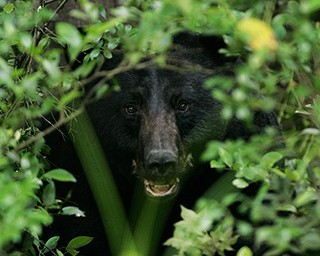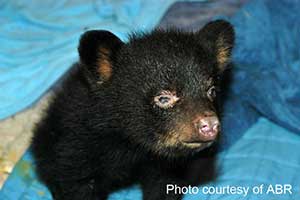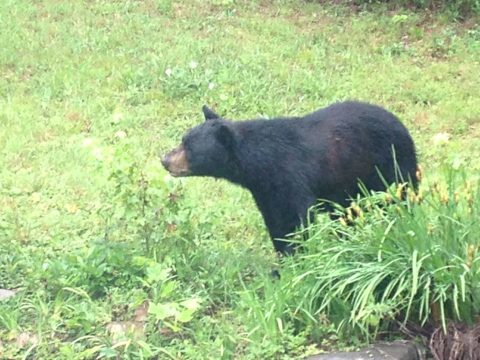HAVE YOU SEEN A BEAR? HERE IS WHAT TO DO
Black Bears in Town
As bear and human populations increase and more people move near public lands and bear inhabited areas, bear-human interactions are increasing creating potentially dangerous situations. To learn more about coexisting with bears, go to the Bear Wise Website. You can also help prevent safety concerns by following these Bear Wise Basics:
- Never feed or approach bears.
- Do not store food, garbage, or other recyclables in areas accessible to bears.
- Do not feed birds or other wildlife where bears are active.
- Feed outdoor pets a portion size they will completely consume during each meal and securely store pet foods.
- Keep grills and smokers clean and stored in a secure area when not in use.
- Talk to family and neighbors when bear activity is occurring in your area.
What to do if a bear approaches you in town:
- Bears will almost always find an escape route if they are left alone.
- Shout and throw sticks or rocks in the vicinity of the bear to encourage flight once an escape route has been established.
- Females with cubs will often climb a tree to for escape cover; never surround a tree holding any bear, especially a female with cubs!
- Locate and remove the lure that caused the bear to come into your area. There is almost always a safe escape route when bears enter towns. Crowd control is the initial concern as the behavior of a cornered bear can be unpredictable. Immediately report to the TWRA or local police any sightings of bears within areas of human population centers.
Black bears roamed all of Tennessee at one time. After European settlement, the numbers started dropping. Thanks to conservation and management efforts, black bears are making a dramatic comeback in the Southeast and more and more sightings have been reported in our area.
As bears expand into areas with suitable habitats, it is important for communities to learn how to coexist with them. We have listed here information and links that will get you started learning more about the bears in Tennessee.
You can learn how to determine if the bear is sick, injured, or orphaned, how to keep your property safe, and more. The TWRA would like your assistance in tracking the recolonization of the black bear into Tennessee. Follow the link below to file a report if you see a bear.
This form is for reporting a sighting only. You CAN NOT use this form to report a sick or injured bear. Please use our contact us page to find your regional office if you need help with a sick or injured bear.
What does a healthy bear look like?
An example of a healthy black bear is one that is able to eat and move normally in a natural environment. Bears in Tennessee and the southeast are primarily black with a long, straight, brown snout but in other parts of the country, bears can be black, brown, and white. A healthy male Tennessee black bear can be between 4-7 feet long and weigh as much as 500 lbs!
A bear that is exhibiting injuries or behavior that would limit its ability to forage, climb trees, or escape danger would be considered injured and warrants a call to TWRA. A bear that has been struck by a vehicle BUT is able to leave WITHOUT obvious distress or a bear with a simple limp would not be considered injured.
To learn even more about bears visit, bearwise.org.

Sick, Injured, or Orphaned Bears
Only if the mother is confirmed to be dead or the cub remains alone for more than 36 hours and its estimated weight is less than 30 pounds should the TWRA be contacted. The best situation for a cub is to be with its mother! Therefore, please document when the cub is first observed alone and only contact after 36 hours!
A bear that is exhibiting injuries or behavior that would limit its ability to forage, climb trees or escape danger would be considered injured and warrants a call to TWRA. A bear that has been struck by a vehicle BUT is able to leave WITHOUT obvious distress or a bear with a simple limp would not be considered injured.
What does an orphaned cub look like?
TAKE NOTE!!! A bear cub that is simply alone may not be orphaned! The mother may be nearby but could be unseen for a while. An orphaned cub will be alone and is likely missing patches of fur on top of its head between the ears. While it may not be visible from a distance, they usually have scaly skin that often contains abscesses and their gums are pale from anemia as parasites are removing nutrition from their blood.

YOUR Responsibility for Black Bears!
Black bears are one of Tennessee’s state treasures and no other animal exemplifies the wilderness experience like them.
They have been called a charismatic mega-fauna and for good reason – everyone from non-hunters, to hunters, to wildlife watchers – we all love bears in our own special ways. For these reasons, it is everyone’s responsibility to keep them wild and keep them alive.
The age-old adages: GARBAGE KILLS BEARS and A FED BEAR IS A DEAD BEAR could not be truer. Nationwide bear management experience has clearly shown that bears attracted to human food sources, or that are deliberately fed by humans, have a relatively short life.
The survival rate of bears receiving food from people is likely a fraction of that of wild bears that do not have repeated contact with humans. The deliberate and accidental feeding of bears is socially irresponsible and causes animals to become conditioned and habituated to people.
Bears that habituate to human presence eventually become a threat to human safety. The end result is that such bears are often killed by intolerant and/or fearful landowners or have to be destroyed by the TWRA.
The primary corrective action to this management dilemma is to simply restrict the access bears have to human foods. However, state and federal agencies have confronted significant challenges in bringing about even moderate changes to human behavior to achieve greater safety for humans and bears.
Tennessee residents and visitors can support bears by taking steps to ensure that wild bears remain “wild” by carefully managing sources of human food or garbage that might attract bears.
The wise stewardship of the habitat we share with bears is the joint responsibility of both wildlife managers and the public and will be essential for a viable future for our state treasure, the black bears of Tennessee. Encountering Black Bears
To learn about what to do when encountering a bear while Hiking and Camping visit, bearwise.org.
THINGS TO KNOW:
- While black bears are usually tolerant of humans, they should always be treated as wild animals, whether in residential or backcountry areas.
- Black bears are rarely aggressive towards people and typically go out of their way to avoid contact, however as human development continues and bear numbers increase, occasional interactions will be unavoidable.
- Black bears are extremely powerful animals whose behaviors can be unpredictable.
- Black bears are very curious animals and this should not be confused with aggression.
- Startled bears will often confront intruders by turning sideways to appear larger, make woofing and teeth clacking sounds, salivate, lay their ears back and slap the ground with their paws. These are warnings for you to leave the area.
- Bears will often stand on their hind legs to get a better view or a better sense of hearing and smell.
Following these simple guidelines will minimize many unnecessary and potentially dangerous encounters.
- Never feed or approach bears!
- If a bear approaches you in the wild, it is probably trying to assess your presence.
- If you see a black bear from a distance, alter your route of travel, return the way you came, or wait until it leaves the area.
- Make your presence known by yelling and shouting at the bear in an attempt to scare it away.
- If approached by a bear, stand your ground, raise your arms to appear larger, yell and throw rocks or sticks until it leaves the area.
- When camping in bear country, keep all food stored in a vehicle and away from tents.
- Never run from a black bear! This will often trigger its natural instinct to chase.
- If a black bear attacks, fight back aggressively and do not play dead! Use pepper spray, sticks, rocks, or anything you can find to defend yourself. If cornered or threatened, bears may slap the ground, “pop” their jaws, or “huff” as a warning. If you see these behaviors, you are too close! Slowly back away while facing the bear at all times.
Notify the TWRA immediately if you witness aggressive behavior by black bears! Find the appropriate TWRA office to contact in your area by clicking here.







